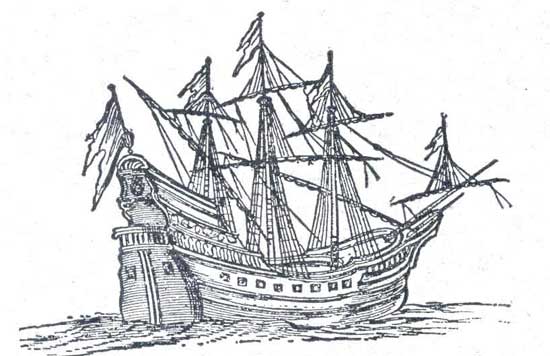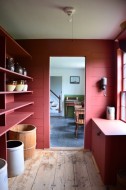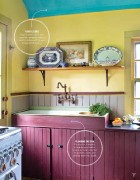
Incident at Ipswich (part 1)
April 20, 2013
In the course of research into our property's history, we came across some intriguing material related to a direct ancestor of our farm's 1824 founder, Edward Bugbee. With further research we cobbled together one family's true story.
Incident at Ipswich
Edward Bugby was born in 1594, in Stratford-le-bow, England, on the Lea River near its junction with the Thames. Sometime around 1628, in Ipswich, Suffolk County, England, he married Rebecca Jacob. By the time their daughter, Sarah, was born in 1630, Britain had already been entrenched, for a number of years, in a period of political turmoil, social unrest and economic uncertainty.
On top of that, the Church of England, in consort with the Crown, had launched a campaign of religious persecution against a growing Puritan reform movement, whose mission was to revitalize a church grown stale, tyrannical and corrupt.
The situation worsened for the Puritans in 1633, with the appointment of William Laud, a fierce opponent to their cause, as the Archbishop of Canterbury. It was at this critical moment that Edward and Rebecca chose to abandon their comfortable middle-class life in Ipswich and embark on a dangerous transatlantic journey. They would take their chances in the untested wilderness of the Massachusetts Bay Colony.
The process, technicalities and red tape involved with their preparations were likely frustrating and expensive. They had to acquire licenses and documents to pass the port - then locate a ship. Finding an appropriate vessel would have involved an intensive search followed by serious negotiations. They had to procure provisions for their passage, as well as for their first year in New England. All this by necessity must have been accomplished surreptitiously.
Once everything was in place, they faced the prospects of a risky voyage that could be both harrowing and miserable; for themselves and for their young child.
Early in February,1634, leaving family, friends and homeland behind, the 40 year old Edward, with his 32 year old wife and their 4 year old daughter, boarded a vessel anchored in Ipswich Harbor on the estuary of the Orwell River. The passenger list consisted largely of single men, married couples and families; as many children as adults, some as young as one year old. They were middle class artisans and farmers, most with aspirations similar to the small Bugby clan. Little did they know they would soon become embroiled in an incident with historic implications.
The ship called the "Francis," was commanded by Master John Cutter and carried 84 passengers. It was one of two such vessels moored in the harbor that day. The other was the "Elizabeth" with 101 passengers and Master William Andrewes at her helm. These two captains were planning to make their passage in tandem for their mutual benefit and safety. Their ships, rigged for a lengthy uncertain voyage, were amply stocked with supplies and provisions. Edward and Rebecca's courage would be tested when they were forced to languish - their passage delayed.
There was immediate opposition to this progressive contingent by conservative officials of the Church of England who felt no sympathy for the Puritan's case. On February 4, the Archdeacon of Suffolk's agent, Henry Dade, the Commissary of Suffolk, wrote a letter from his office in Ipswich, to the Church of England's principal leader, the Archbishop of Canterbury, William Laud. Dade reported that two ships were about to sail from Ipswich Port with men and provisions for their abiding in New England; that in each ship are appointed to go about six score men. He supposed they were debtors or persons discontented with the government of the Church of England.
He told the Archbishop that his intelligence informed him, some 600 more were planning to shortly follow and described the ill effects of suffering such "swarms" going out of England could cause; that trade would be overthrown and persons indebted would flee to New England to avoid bankruptcy and be treated as religious men for leaving the kingdom because they could not endure the ceremonies of the church.
He blamed the Puritan minister, Samuel Ward, for inciting desire among his flock to relocate to Massachusetts. Ward, who was stationed in the ancient church of St. Mary-le-Tower, the civic church of the Corporation of Ipswich, was very likely Edward and Rebecca's spiritual and temporal counselor. Dade complained in his letter, "Of the breeders of these Mr. Ward, of Ipswich, is chief of these parts, who, by preaching against ye contents of ye Booke of Common Prayer, and set prayer, and of a fear of altering our Religion, hath caused this giddiness."
He tells Laud that he has already exhibited "articles" against Ward in the Court of High Commission, and expresses the fear that he must bear the brunt alone thereby incurring the hatred of Ward's adherents who are very powerful in London and about Ipswich.
He implored the Archbishop to consider a "stay" of the voyage, calling for Timothy Dalton, a moderate Puritan minister and a close friend of Ward to appear. "Ye cause of my writing I am bold to affirm to your Graces consideration, which is now fitting to move for an order at ye Council Table, to send for Mr Dalton (who is otherwise an honest man) parson of Woluestun by Ipswich, and who is a great stickler for ye transporting of those people that should goe over unto Newe England, that ye same Mr Dalton may be inhibited from medling in ye afore-said business; ye voyage to be stayed."
Historical material thanks to; John Laurens Blake, The English Home of Mr. Timothy Dalton, B. A., privately printed, 1889
(comments = 0)
leave a comment

fineartistmade blog
A journal about home design, gardening, art & all things Maine. Read more...
- June 2025
- December 2022
- November 2022
- October 2022
- November 2021
- May 2020
- October 2019
- August 2019
- July 2019
- September 2018
- April 2018
- December 2017
- August 2017
- June 2017
- May 2017
- December 2016
- August 2016
- July 2016
- April 2016
- November 2015
- June 2015
- May 2015
- March 2015
- October 2014
- March 2014
- February 2014
- January 2014
- December 2013
- November 2013
- July 2013
- May 2013
- April 2013
- March 2013
- January 2013
- December 2012
- November 2012
- August 2012
- June 2012
- April 2012
- March 2012
- February 2012
- January 2012
- December 2011
- October 2011
- August 2011
- July 2011
- June 2011
- May 2011
- April 2011
- March 2011
- February 2011
- January 2011
- December 2010
- November 2010
- October 2010
- September 2010
- August 2010
- July 2010
- June 2010
- May 2010
- My Scandinavian Home
- Daytonian in Manhattan
- {frolic!}
- I Married An Irish Farmer
- Smitten Kitchen
- The Curated House
- even*cleveland
- Mary Swenson | a scrapbook
- Ill Seen, Ill Said
- Gross & Daley Photography
- Remodelista
- Abby Goes Design Scouting
- Mint
- the marion house book
- 3191 Miles Apart
- Svatava
- Katy Elliott
- Poppytalk
- Kiosk
- decor8
- KBCULTURE
- Lari Washburn






